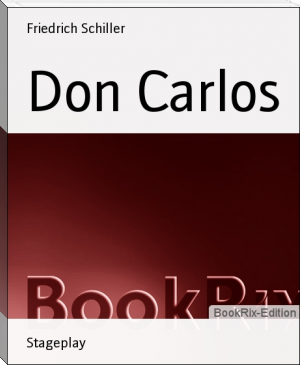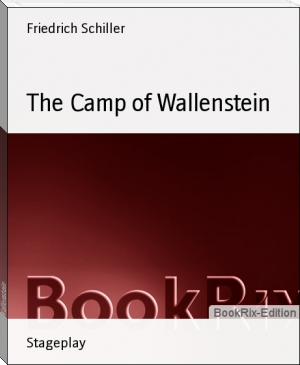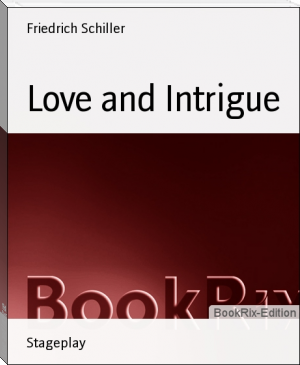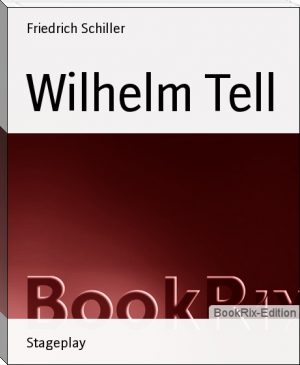Fiesco, Friedrich Schiller [uplifting novels .TXT] 📗

- Author: Friedrich Schiller
Book online «Fiesco, Friedrich Schiller [uplifting novels .TXT] 📗». Author Friedrich Schiller
niggardly assassin. (MOOR looks at him with astonishment.) What dost thou gaze at? (MOOR takes up the money - lays it down - takes it up again, and looks at FIESCO with increased astonishment). What dost thou mean?
MOOR (throwing the money resolutely upon the table). Sir, that money I have not earned - I deserve it not.
FIESCO. Blockhead, thou hast deserved the gallows; but the offended elephant tramples on men not on worms. Were thy life worth but two words I would have thee hanged.
MOOR (bowing with an air of pleasure at his escape). Sir, you are too good - -
FIESCO. Not towards thee! God forbid! No. I am amused to think my humor can make or unmake such a villain as thou, therefore dost thou go scot-free - understand me aright - I take thy failure as an omen of my future greatness - 'tis this thought that renders me indulgent, and preserves thy life.
MOOR (in a tone of confidence). Count, your hand! honor for honor. If any man in this country has a throat too much - command me, and I'll cut it - gratis.
FIESCO. Obliging scoundrel! He would show his gratitude by cutting throats wholesale!
MOOR. Men like me, sir, receive no favor without acknowledgment. We know what honor is.
FIESCO. The honor of cut-throats?
MOOR. Which is, perhaps, more to be relied on than that of your men of character. They break their oaths made in the name of God. We keep ours pledged to the devil.
FIESCO. Thou art an amusing villain.
MOOR. I rejoice to meet your approbation. Try me; you will find in me a man who is a thorough master of his profession. Examine me; I can show my testimonials of villany from every guild of rogues - from the lowest to the highest.
FIESCO. Indeed! (seating himself.) There are laws and systems then even among thieves. What canst thou tell me of the lowest class?
MOOR. Oh, sir, they are petty villains, mere pick-pockets. They are a miserable set. Their trade never produces a man of genius; 'tis confined to the whip and workhouse - and at most can lead but to the gallows.
FIESCO. A charming prospect! I should like to hear something of a superior class.
MOOR. The next are spies and informers - tools of importance to the great, who from their secret information derive their own supposed omniscience. These villains insinuate themselves into the souls of men like leeches; they draw poison from the heart, and spit it forth against the very source from whence it came.
FIESCO. I understand thee - go on - -
MOOR. Then come the conspirators, villains that deal in poison, and bravoes that rush upon their victims from some secret covert. Cowards they often are, but yet fellows that sell their souls to the devil as the fees of their apprenticeship. The hand of justice binds their limbs to the rack or plants their cunning heads on spikes - this is the third class.
FIESCO. But tell me! When comes thy own?
MOOR. Patience, my lord - that is the very point I'm coming to - I have already passed through all the stages that I mentioned: my genius soon soared above their limits. 'Twas but last night I performed my masterpiece in the third; this evening I attempted the fourth, and proved myself a bungler.
FIESCO. And how do you describe that class?
MOOR (with energy). They are men who seek their prey within four walls, cutting their way through every danger. They strike at once, and, by their first salute, save him whom they approach the trouble of returning thanks for a second. Between ourselves they are called the express couriers of hell: and when Beelzebub is hungry they want but a wink, and he gets his mutton warm.
FIESCO. Thou art an hardened villain - such a tool I want. Give me thy hand - thou shalt serve me.
MOOR. Jest or earnest?
FIESCO. In full earnest - and I'll pay thee yearly a 'thousand sequins.
MOOR. Done, Lavagna! I am yours. Away with common business - employ me in whate'er you will. I'll be your setter or your bloodhound - your fox, your viper - your pimp, or executioner. I'm prepared for all commissions
- except honest ones; in those I am as stupid as a block.
FIESCO. Fear not! I would not set the wolf to guard the lamb. Go thou through Genoa to-morrow and sound the temper of the people. Narrowly inquire what they think of the government, and of the house of Doria - what of me, my debaucheries, and romantic passion. Flood their brains with wine, until the sentiments of the heart flow over. Here's money - lavish it among the manufacturers - -
MOOR. Sir!
FIESCO. Be not afraid - no honesty is in the case. Go, collect what help thou canst. To-morrow I will hear thy report.
[Exit.
MOOR (following). Rely on me. It is now four o'clock in the morning, by eight to-morrow you shall hear as much news as twice seventy spies can furnish.
[Exit.
SCENE X. - An apartment in the house of VERRINA.
BERTHA on a couch, supporting her head on her hand -
VERRINA enters with a look of dejection.
BERTHA (starts up frightened). Heavens! He is here!
VERRINA (stops, looking at her with surprise). My daughter affrighted at her father!
BERTHA. Fly! fly! or let me fly! Father, your sight is dreadful to me!
VERRINA. Dreadful to my child! - my only child!
BERTHA (looking at him mournfully). Oh! you must seek another. I am no more your daughter.
VERRINA. What, does my tenderness distress you?
BERTHA. It weighs me down to the earth.
VERRINA. How, my daughter! do you receive me thus? Formerly, when I came home, my heart o'erburdened with sorrows, my Bertha came running towards me, and chased them away with her smiles. Come, embrace me, my daughter! Reclined upon thy glowing bosom, my heart, when chilled by the sufferings of my country, shall grow warm again. Oh, my child! this day I have closed my account with the joys of this world, and thou alone (sighing heavily) remainest to me.
BERTHA (casting a long and earnest look at him). Wretched father!
VERRINA (eagerly embracing her). Bertha! my only child! Bertha! my last remaining hope! The liberty of Genoa is lost - Fiesco is lost - and thou (pressing her more strongly, with a look of despair) mayest be dishonored!
BERTHA (tearing herself from him). Great God! You know, then - -
VERRINA (trembling). What?
BERTHA. My virgin honor - -
VERRINA (raging). What?
BERTHA. Last night - -
VERRINA (furiously.) Speak! What!
BERTHA. Force. (Sinks down upon the side of the sofa.)
VERRINA (after a long pause, with a hollow voice). One word more, my daughter - thy last! Who was it?
BERTHA. Alas, what an angry deathlike paleness! Great God, support me! How his words falter! His whole frame trembles!
VERRINA. I cannot comprehend it. Tell me, my daughter - who?
BERTHA. Compose yourself, my best, my dearest father!
VERRINA (ready to faint). For God's sake - who?
BERTHA. A mask - -
VERRINA (steps back, thoughtfully). No! That cannot be! - the thought is idle - (smiling to himself ). What a fool am I to think that all the poison of my life can flow but from one source! (Firmly addressing himself to BERTHA.) What was his stature, less than mine or taller?
BERTHA. Taller.
VERRINA (eagerly). His hair? Black, and curled?
BERTHA. As black as jet and curled?
VERRINA (retiring from her in great emotion). O God! my brain! my brain! His voice?
BERTHA. Was deep and harsh.
VERRINA (impetuously). What color was - No! I'll hear no more! 'His cloak! What color?
BERTHA. I think his cloak was green.
VERRINA (covering his face with his hands, falls on the couch). No more. This can be nothing but a dream!
BERTHA (wringing her hands). Merciful heaven! Is this my father?
VERRINA (after a pause, with a forced smile). Right! It serves thee right - coward Verrina! The villain broke into the sanctuary of the laws. This did not rouse thee. Then he violated the sanctuary of thy honor (starting up). Quick! Nicolo! Bring balls and powder - but stay - my sword were better. (To BERTHA.) Say thy prayers! Ah! what am I going to do?
BERTHA. Father, you make me tremble - -
VERRINA. Come, sit by me, Bertha! (in a solemn manner.) Tell me, Bertha, what did that hoary-headed Roman, when his daughter - like you - how can I speak it! fell a prey to ignominy? Tell me, Bertha, what said Virginius to his dishonored daughter?
BERTHA (shuddering). I know not.
VERRINA. Foolish girl! He said nothing - but (rising hastily and snatching up a sword) he seized an instrument of death - -
BERTHA (terrified, rushes into his arms). Great God! What would you do, my father?
VERRINA (throwing away the sword). No! There is still justice left in Genoa.
SCENE XI.
SACCO, CALCAGNO, the former.
CALCAGNO. Verrina, quick! prepare! to-day begins the election week of the republic. Let us early to the Senate House to choose the new senators. The streets are full of people, you will undoubtedly accompany us (ironically) to behold the triumph of our liberty.
SACCO (to CALCAGNO). But what do I see? A naked sword! Verrina staring wildly! Bertha in tears!
CALCAGNO. By heavens, it is so. Sacco! some strange event has happened here.
VERRINA (placing two chairs). Be seated.
SACCO. Your looks, Verrina, fill us with apprehension.
CALCAGNO. I never saw you thus before - Bertha is in tears, or your grief would have seemed to presage our country's ruin.
VERRINA. Ruin! Pray sit down. (They both seat themselves.)
CALCAGNO. My friend, I conjure you - -
VERRINA. Listen to me.
CALCAGNO (to SACCO). I have sad misgivings.
VERRINA. Genoese! you both know the antiquity of my family. Your ancestors were vassals to my own. My forefathers fought the battles of the state, their wives were patterns of virtue. Honor was our sole inheritance, descending unspotted from the father to the son. Can any one deny it?
SACCO. No.
CALCAGNO. No one, by the God of heaven!
VERRINA. I am the last of my family. My wife has long been dead. This daughter is all she left me. You are witnesses, my friends, how I have brought her up. Can anyone accuse me of neglect?
CALCAGNO. No. Your daughter is a bright example to her sex.
VERRINA. I am old, my friends. On this one daughter all my hopes were placed. Should I lose her, my race becomes extinct. (After a pause, with a solemn voice). I have lost her. My family is dishonored.
SACCO and CALCAGNO. Forbid it, heaven! (BERTHA on the couch, appears much affected.)
VERRINA. No. Despair not, daughter! These men are just and brave. If they feel thy wrongs
MOOR (throwing the money resolutely upon the table). Sir, that money I have not earned - I deserve it not.
FIESCO. Blockhead, thou hast deserved the gallows; but the offended elephant tramples on men not on worms. Were thy life worth but two words I would have thee hanged.
MOOR (bowing with an air of pleasure at his escape). Sir, you are too good - -
FIESCO. Not towards thee! God forbid! No. I am amused to think my humor can make or unmake such a villain as thou, therefore dost thou go scot-free - understand me aright - I take thy failure as an omen of my future greatness - 'tis this thought that renders me indulgent, and preserves thy life.
MOOR (in a tone of confidence). Count, your hand! honor for honor. If any man in this country has a throat too much - command me, and I'll cut it - gratis.
FIESCO. Obliging scoundrel! He would show his gratitude by cutting throats wholesale!
MOOR. Men like me, sir, receive no favor without acknowledgment. We know what honor is.
FIESCO. The honor of cut-throats?
MOOR. Which is, perhaps, more to be relied on than that of your men of character. They break their oaths made in the name of God. We keep ours pledged to the devil.
FIESCO. Thou art an amusing villain.
MOOR. I rejoice to meet your approbation. Try me; you will find in me a man who is a thorough master of his profession. Examine me; I can show my testimonials of villany from every guild of rogues - from the lowest to the highest.
FIESCO. Indeed! (seating himself.) There are laws and systems then even among thieves. What canst thou tell me of the lowest class?
MOOR. Oh, sir, they are petty villains, mere pick-pockets. They are a miserable set. Their trade never produces a man of genius; 'tis confined to the whip and workhouse - and at most can lead but to the gallows.
FIESCO. A charming prospect! I should like to hear something of a superior class.
MOOR. The next are spies and informers - tools of importance to the great, who from their secret information derive their own supposed omniscience. These villains insinuate themselves into the souls of men like leeches; they draw poison from the heart, and spit it forth against the very source from whence it came.
FIESCO. I understand thee - go on - -
MOOR. Then come the conspirators, villains that deal in poison, and bravoes that rush upon their victims from some secret covert. Cowards they often are, but yet fellows that sell their souls to the devil as the fees of their apprenticeship. The hand of justice binds their limbs to the rack or plants their cunning heads on spikes - this is the third class.
FIESCO. But tell me! When comes thy own?
MOOR. Patience, my lord - that is the very point I'm coming to - I have already passed through all the stages that I mentioned: my genius soon soared above their limits. 'Twas but last night I performed my masterpiece in the third; this evening I attempted the fourth, and proved myself a bungler.
FIESCO. And how do you describe that class?
MOOR (with energy). They are men who seek their prey within four walls, cutting their way through every danger. They strike at once, and, by their first salute, save him whom they approach the trouble of returning thanks for a second. Between ourselves they are called the express couriers of hell: and when Beelzebub is hungry they want but a wink, and he gets his mutton warm.
FIESCO. Thou art an hardened villain - such a tool I want. Give me thy hand - thou shalt serve me.
MOOR. Jest or earnest?
FIESCO. In full earnest - and I'll pay thee yearly a 'thousand sequins.
MOOR. Done, Lavagna! I am yours. Away with common business - employ me in whate'er you will. I'll be your setter or your bloodhound - your fox, your viper - your pimp, or executioner. I'm prepared for all commissions
- except honest ones; in those I am as stupid as a block.
FIESCO. Fear not! I would not set the wolf to guard the lamb. Go thou through Genoa to-morrow and sound the temper of the people. Narrowly inquire what they think of the government, and of the house of Doria - what of me, my debaucheries, and romantic passion. Flood their brains with wine, until the sentiments of the heart flow over. Here's money - lavish it among the manufacturers - -
MOOR. Sir!
FIESCO. Be not afraid - no honesty is in the case. Go, collect what help thou canst. To-morrow I will hear thy report.
[Exit.
MOOR (following). Rely on me. It is now four o'clock in the morning, by eight to-morrow you shall hear as much news as twice seventy spies can furnish.
[Exit.
SCENE X. - An apartment in the house of VERRINA.
BERTHA on a couch, supporting her head on her hand -
VERRINA enters with a look of dejection.
BERTHA (starts up frightened). Heavens! He is here!
VERRINA (stops, looking at her with surprise). My daughter affrighted at her father!
BERTHA. Fly! fly! or let me fly! Father, your sight is dreadful to me!
VERRINA. Dreadful to my child! - my only child!
BERTHA (looking at him mournfully). Oh! you must seek another. I am no more your daughter.
VERRINA. What, does my tenderness distress you?
BERTHA. It weighs me down to the earth.
VERRINA. How, my daughter! do you receive me thus? Formerly, when I came home, my heart o'erburdened with sorrows, my Bertha came running towards me, and chased them away with her smiles. Come, embrace me, my daughter! Reclined upon thy glowing bosom, my heart, when chilled by the sufferings of my country, shall grow warm again. Oh, my child! this day I have closed my account with the joys of this world, and thou alone (sighing heavily) remainest to me.
BERTHA (casting a long and earnest look at him). Wretched father!
VERRINA (eagerly embracing her). Bertha! my only child! Bertha! my last remaining hope! The liberty of Genoa is lost - Fiesco is lost - and thou (pressing her more strongly, with a look of despair) mayest be dishonored!
BERTHA (tearing herself from him). Great God! You know, then - -
VERRINA (trembling). What?
BERTHA. My virgin honor - -
VERRINA (raging). What?
BERTHA. Last night - -
VERRINA (furiously.) Speak! What!
BERTHA. Force. (Sinks down upon the side of the sofa.)
VERRINA (after a long pause, with a hollow voice). One word more, my daughter - thy last! Who was it?
BERTHA. Alas, what an angry deathlike paleness! Great God, support me! How his words falter! His whole frame trembles!
VERRINA. I cannot comprehend it. Tell me, my daughter - who?
BERTHA. Compose yourself, my best, my dearest father!
VERRINA (ready to faint). For God's sake - who?
BERTHA. A mask - -
VERRINA (steps back, thoughtfully). No! That cannot be! - the thought is idle - (smiling to himself ). What a fool am I to think that all the poison of my life can flow but from one source! (Firmly addressing himself to BERTHA.) What was his stature, less than mine or taller?
BERTHA. Taller.
VERRINA (eagerly). His hair? Black, and curled?
BERTHA. As black as jet and curled?
VERRINA (retiring from her in great emotion). O God! my brain! my brain! His voice?
BERTHA. Was deep and harsh.
VERRINA (impetuously). What color was - No! I'll hear no more! 'His cloak! What color?
BERTHA. I think his cloak was green.
VERRINA (covering his face with his hands, falls on the couch). No more. This can be nothing but a dream!
BERTHA (wringing her hands). Merciful heaven! Is this my father?
VERRINA (after a pause, with a forced smile). Right! It serves thee right - coward Verrina! The villain broke into the sanctuary of the laws. This did not rouse thee. Then he violated the sanctuary of thy honor (starting up). Quick! Nicolo! Bring balls and powder - but stay - my sword were better. (To BERTHA.) Say thy prayers! Ah! what am I going to do?
BERTHA. Father, you make me tremble - -
VERRINA. Come, sit by me, Bertha! (in a solemn manner.) Tell me, Bertha, what did that hoary-headed Roman, when his daughter - like you - how can I speak it! fell a prey to ignominy? Tell me, Bertha, what said Virginius to his dishonored daughter?
BERTHA (shuddering). I know not.
VERRINA. Foolish girl! He said nothing - but (rising hastily and snatching up a sword) he seized an instrument of death - -
BERTHA (terrified, rushes into his arms). Great God! What would you do, my father?
VERRINA (throwing away the sword). No! There is still justice left in Genoa.
SCENE XI.
SACCO, CALCAGNO, the former.
CALCAGNO. Verrina, quick! prepare! to-day begins the election week of the republic. Let us early to the Senate House to choose the new senators. The streets are full of people, you will undoubtedly accompany us (ironically) to behold the triumph of our liberty.
SACCO (to CALCAGNO). But what do I see? A naked sword! Verrina staring wildly! Bertha in tears!
CALCAGNO. By heavens, it is so. Sacco! some strange event has happened here.
VERRINA (placing two chairs). Be seated.
SACCO. Your looks, Verrina, fill us with apprehension.
CALCAGNO. I never saw you thus before - Bertha is in tears, or your grief would have seemed to presage our country's ruin.
VERRINA. Ruin! Pray sit down. (They both seat themselves.)
CALCAGNO. My friend, I conjure you - -
VERRINA. Listen to me.
CALCAGNO (to SACCO). I have sad misgivings.
VERRINA. Genoese! you both know the antiquity of my family. Your ancestors were vassals to my own. My forefathers fought the battles of the state, their wives were patterns of virtue. Honor was our sole inheritance, descending unspotted from the father to the son. Can any one deny it?
SACCO. No.
CALCAGNO. No one, by the God of heaven!
VERRINA. I am the last of my family. My wife has long been dead. This daughter is all she left me. You are witnesses, my friends, how I have brought her up. Can anyone accuse me of neglect?
CALCAGNO. No. Your daughter is a bright example to her sex.
VERRINA. I am old, my friends. On this one daughter all my hopes were placed. Should I lose her, my race becomes extinct. (After a pause, with a solemn voice). I have lost her. My family is dishonored.
SACCO and CALCAGNO. Forbid it, heaven! (BERTHA on the couch, appears much affected.)
VERRINA. No. Despair not, daughter! These men are just and brave. If they feel thy wrongs
Free e-book «Fiesco, Friedrich Schiller [uplifting novels .TXT] 📗» - read online now
Similar e-books:





Comments (0)